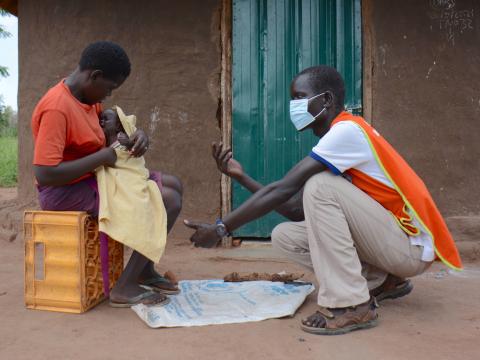Over 4,000 community volunteers boost fight against infectious diseases in South Sudan

“My baby Shedrine’s poor health made me lose hope”, says Anzoa Nancy, a 21-year old mother of two. One year and nine months old daughter Shedrine Tracy is her second born. Nancy was studying in primary six when she became a mother after marrying 21-year-old husband Wani Peter in 2018.
Her husband was a senior two drop out and works as a motorcycle driver to raise his young family in Nimule, a part of South Sudan’s Eastern Equatoria. “My first-born Catherine is now three years old and lives with her grandmother Jessica. I visit them over the weekend when I am done with my work in my farm”, says Nancy.

When Nancy gave birth to Shedrine at Nimule Primary Health Care Centre (PHCC), the doctor looked disturbed pacing up and down then asked Peter to go to his clinic. He was told his child is alive but unwell and needs to be brought to a hospital in Uganda for proper treatment.
“My husband could not afford Shedrine’s recommended treatment. We got admitted at Nimule PHCC for a month and then discharged after Shedrine recovered”, recalls Nancy. Shedrine indeed looked fine, even started walking. But on May 2021, she developed weakness of the lower limbs which Nancy tried to treat with local herbs but her condition did not improve.

“As I was relaxing under a tree after coming from the farm, I was visited by Jackline Taban who introduced herself as a community key informant for Abila East and told me she wanted to talk about polio”, she adds.
Nancy remembered being reluctant to talk to Jackline but listened to her anyway. “I was tired and wanted to rest but since Nancy said she had been coming to the house and didn’t meet anyone, I listened to her”, she says.
With the project team's regular visits, I learned a lot about the health condition of my baby. I appreciated the visits and the team’s great work.
On Jackline’s second visit, Nancy was with Shedrine and she began confiding about her daughter’s condition having diarrhea and inability to walk like other children her age.
“She came back the following day with the Boma Health Promoter Oniba Alex, Project Supervisor Onzi Justin and one person from the county to check on my baby. They told me Shedrine seems to have a condition called acute flaccid paralysis which I did not understand. They added it is normally associated with polio”, Nancy shares.

After two days, the World Health Organization (WHO) team came to my home and took a sample of Shedrine’s stool. Towards the end of July, Oniba told Nancy that the test results from WHO confirmed Shedrine having Acute Flaccid Paralysis and was referred to the PHCC being the nearest health facility for further management.
At the PHCC, Shedrine went. through physiotherapy sessions. Nancy says, “With the project team's regular visits, I learned a lot about the health condition of my baby. I appreciated the visits and the team’s great work. The community have become aware of diseases like polio, measles, yellow fever, coronavirus and Ebola.”

According to Onzi, the Madi Corridor where he is in-charge has registered three suspected cases of Acute Flaccid Paralysis. He says, “The samples are usually collected and analyzed by the WHO, one of which was Shedrine’s and was found positive. Two more tests are being analyzed.”
CORE Polio Project Director Anthony Kisanga says, “Through funding from USAID, the project is able to support integrated community-based surveillance with focus on poliomyelitis, measles, yellow fever, COVID-19, Ebola Virus Disease and adverse conditions following immunization in 24 counties in Eastern, Central and Western Equatoria states.
He adds, “The involvement, hard work and participation of the organized community network composed of 4,665 community volunteers helped strengthened the surveillance system in South Sudan thus protecting more children and supporting mothers like Nancy.”

Related Story: Nadia helps advocate for polio-free South Sudan
Story and photos by Jemima Tumalu, Communications Officer